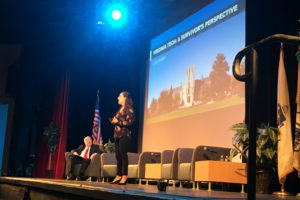
Lisa Hamp, a survivor of the 2007 mass shooting at Virginia Tech, speaks at Cape Cod Community College about the experience and how it’s impacted her life since. Tim Dunn/CapeCod.com
BARNSTABLE – No matter what side of the gun debate you stand on, the rate at which mass shootings have picked up across the country is alarming.
Cape Cod Community College held a community conversation on Wednesday on ending senseless gun violence. The event, titled “What Comes After ‘Thoughts and Prayers,” was held in the Tilden Arts Center main theater on the College’s West Barnstable Campus.
The program featured four panelists who spoke about their experiences in mass shootings.
Two mass shooting survivors acted as guest speakers: Lisa Hamp, a survivor of the 2007 Virginia Tech shooting that left 33 people dead; and New Bedford Police Sergeant Joshua Fernandes, a survivor and first responder of the 2006 Fox Lady Night Club shooting that killed three and injured several others.
The program also featured retired Massachusetts State Police Trooper and expert in behavioral observation and threat prevention Todd McGhee, and Professor of Constitutional Law at UMass Dartmouth Dwight Duncan.
Hamp and Fernandes began the event discussing their experiences as survivors and how their lives and perspectives have changed since.
“My classmates and I had to build a barricade to keep the shooter out and from entering our classroom. So, when we first heard gunshots it was this disconnect between what my mind is trying to process, like, ‘okay, that sounds like gunshots, but that doesn’t belong in school,’ so you’re logically trying to think ‘what else can that be,’” said Hamp as she recounted her experience of the 2007 college mass shooting.
“But my gut is telling me something isn’t right. So, I had classmates who went out into the hall, they saw the shooter, and they just came back in and in and just built a barricade with desks and a table, so that when he came to our door and shot through our door, we were able to keep him out until law enforcement arrived on the scene.”
Hamp says she denied having been impacted by the horrific shooting for nearly eight years, until she sought help with her mental health and realized just how severe that impact was.
“I had an eating disorder and I went to an eating disorder counselor and as we started to figure out what was behind the eating disorder, the thing I didn’t want to talk about was the Virginia Tech shooting. So, all of those emotions associated with it: fear, loneliness, anxiety, lack of self-confidence, all of that was triggered by what happened that day,” Hamp said.
“It’s hard for me, especially given the long recovery journey I had, and I always hope and pray that people can get to mental health resources sooner than I did and don’t have as many long-lost years as I did.”
Following Hamp, New Bedford Police Sergeant Joshua Fernandes described his experience in responding to and surviving the Foxy Lady Night Club shooting in December of 2006.
“I have various recollections, but my main one was probably fear – not knowing what was next, not knowing what was going to happen, so it takes a toll on you and it’s always going to be with you,” Fernandes said.
“I think because of the lack of knowledge we had we weren’t prepared for that type of firepower. Luckily, we learned from that and we progressed through that through training and our equipment.”
Like Hamp, Sergeant Fernandes says that the mental impact of the shooting he survived has been everlasting.
“You always have that thought in the back of your mind, that mental aspect of it. It’s never going to go away, it’s going to follow you like a shadow unfortunately,” Fernandes said.
Fernandes went on to explain that the 2006 shooting reminded him of a lesson he learned in the police academy as a cadet.
“It’s word I learned I learned in the police academy and what I still use today, it’s complacency. We can’t be complacent on anything, from everyday activities to what you do at your job, especially in this line of work in law enforcement,” he said.
Hamp also described how she’s addressed her own personal safety since the mass shooting she experienced. She says the shooting made her more aware of her surroundings and made her take safety more seriously. She describes it by using a scale of 1-5.
Following their stories, McGhee discussed the characteristics of a shooter, and how to be more pro-active in identifying potential threats before they happen. Professor Duncan followed McGhee with a discussion of the past, present, and future of the second amendment.
“Before April 16, 2007, I was on a scale of 1-5, with 1 being ‘I’m safe all the time. I take my safety for granted. I’m naive about it,’ to a 5 being hypervigilant and obsessed 24-7. On that scale of 1-5, before the Virginia Tech I was a 1, I took my safety for granted,” Hamp explained.
“Then the shooting happened and I flipped to like a 5, where 24-7 my eyes were on the door and my ears are turned on, and I could not relax. Now I’m somewhere where I’m like a 3, where I have a plan for the places I am most often, but I’m not either obsessed with it nor naïve about it. That’s my message today, is to get people sort of in the middle of the scale.”
After the speaking session, the event shifted towards discussion of on what has been learned from mass shootings over the years, particularly since the Virginia Tech shooting, and what measures society should consider moving forward.
Audience members were asked before and during the conversation to submit questions via notecard for a Q&A segment at the end of the event.
By TIM DUNN, CapeCod.com News Center























